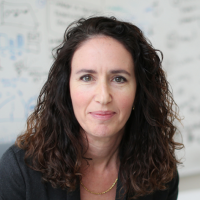Kavli Professor of Brain Science; Director and CEO of Columbia's Zuckerman Institute; Codirector of Columbia's Kavli Institute for Brain Science
Memories guide how we become who we are.
Daphna Shohamy studies learning and memory — whether its how we memorize facts, or slowly learn habits. Recently, she found that there’s a lot more “cross-talk” between these two forms of learning than previously thought, raising questions about what different parts of the brain are doing as we learn, and how what we learn affects the decisions we make.
Read more about Daphna Shohamy, PhD >
Our experiences guide us in many ways. Say you have an argument with a colleague. You might remember the details of the conversation and consciously use those to avoid future clashes. Alternately, subtle elements of your behavior might become unconscious habit, especially as you continue to interact with each other. Both memories for specific events, called episodic memory, and habits are constantly informing the decisions we make. Daphna Shohamy, PhD, an associate professor of psychology, Director and CEO of Columbia’s Mortimer B. Zuckerman Mind Brain Behavior Institute, explores how memories and actions are deeply intertwined.
“Memories of our experiences shape our decisions in a lot of interesting and complicated ways,” she says. “Memories guide how we become who we are.”
To study the neural processes by which memory and decision making interact, Dr. Shohamy puts people in a brain scanner and asks them to play computer games that test different kinds of behaviors. In one task, they draw from two different decks of cards; over time, the subjects learn that drawing from one deck offers a higher chance of winning over the other. In this way, Dr. Shohamy can observe which parts of the brain are active as people gradually form habits. Later, she might ask them to recall the picture on a winning deck, to see what was happening in the brain when they successfully remember and use specific episodic memories to perform the task.
Dr. Shohamy also tests people with brain injuries to see if specific parts of the brain are not just active during learning, but necessary. She has found that people with damage to a region called the hippocampus — a brain area central to learning and memory — have difficulty recalling past events in detail and that this impacts the decisions they make. But they can learn new habits if they see right away whether they chose a winning card (a process known as immediate feedback). Meanwhile, people with damage to an area called the striatum — a region that is related to reward and is deficient in people with Parkinson’s disease — have trouble forming new habits, but they can learn with delayed feedback. Based on this pattern, Dr. Shohamy has shown that if you delay feedback by just a few seconds for people with striatal damage, or if you offer immediate feedback for those with hippocampal damage, each group can learn just fine.
“Understanding the interplay between these learning systems in the brain is something we can use to compensate for deficits,” she says.
Recent work has explored the role of habit formation in anorexia nervosa. Along with colleagues, Dr. Shohamy found that when people make decisions about what to eat, certain parts of the striatum become more active in those with anorexia than in healthy subjects. Understanding this brain circuit — and how it is altered in people with anorexia — may point to new, more effective forms of treatment.
Ultimately, Dr. Shohamy is interested in the cycle by which memory affects our decisions, which then form new memories, and so on. There is a poetic quality, she says, in “this kind of back and forth between our past and our future.”
Young Investigator Award (2014)
Young Investigator Award (2013)
Lenfest Distinguished Faculty Award (2012)
Biderman N, Gershman SJ,
J Exp Psychol Gen.2023 Jun
Biderman N,
Nat Commun.2021 Jul 30
Reinen JM, Van Snellenberg JX, Horga G, Abi-Dargham A, Daw ND,
Schizophr Bull.2016 Nov
Duncan KD,
J Exp Psychol Gen.2016 Nov
Davidow JY, Foerde K, Galván A,
Neuron.2016 Oct 5
Shadlen MN,
Neuron.2016 Jun 1
Zaki J, Kallman S, Wimmer GE, Ochsner K,
J Cogn Neurosci.2016 Sep